Kitchen Substitutions (Save Time, Money and Aggravation)
This post may contain affiliate links. Read my full disclosure here.
It’s so frustrating to be in the middle of cooking and realize you don’t have a needed ingredient on hand. With this list of kitchen substitutions, you can improvise with common pantry ingredients to get your recipe finished.
Since I live out in the country, when I don’t have an ingredient on hand, it’s not very handy to pop out to the store to pick up what I need.
Over the years I’ve found an assortment of ingredient substitutions that have worked well for me, so I thought I would put them all together in one spot and share them with you.
These won’t work *exactly* like the original ingredients, but they should do in a pinch. You may even like them better than the original.
Substituting Sugar and Other Sweeteners
Don’t be afraid to use a little less sugar than called for in a recipe. Many baked goods (especially in the U.S.) are highly sweetened.
1 cup brown sugar = 1 cup white cane sugar plus 1-2 tablespoons molasses (1 for lighter, 2 for darker)
1 cup granulated sugar = 1 cup brown sugar OR 1 3/4 cup packed confectioner’s sugar
1 cup honey = 1-1/4 cup cane sugar plus 1/4 cup liquid
1-1/2 cup corn syrup = 1 cup sugar plus 1/2 cup water
1 cup molasses = 1 cup honey
1 cup of sugar = 18 to 24 stevia sweetener packets, 1/3 to 1/2 teaspoon of undiluted stevia powder or 1 teaspoon of a liquid stevia extract
Maple sugar, 1/2 cup packed = 1 cup maple syrup (you may need to adjust liquids in the recipe)
Check out the post “Make Maple Syrup and Maple Syrup Substitute” for maple syrup baking tips and a recipe for a syrup substitute.
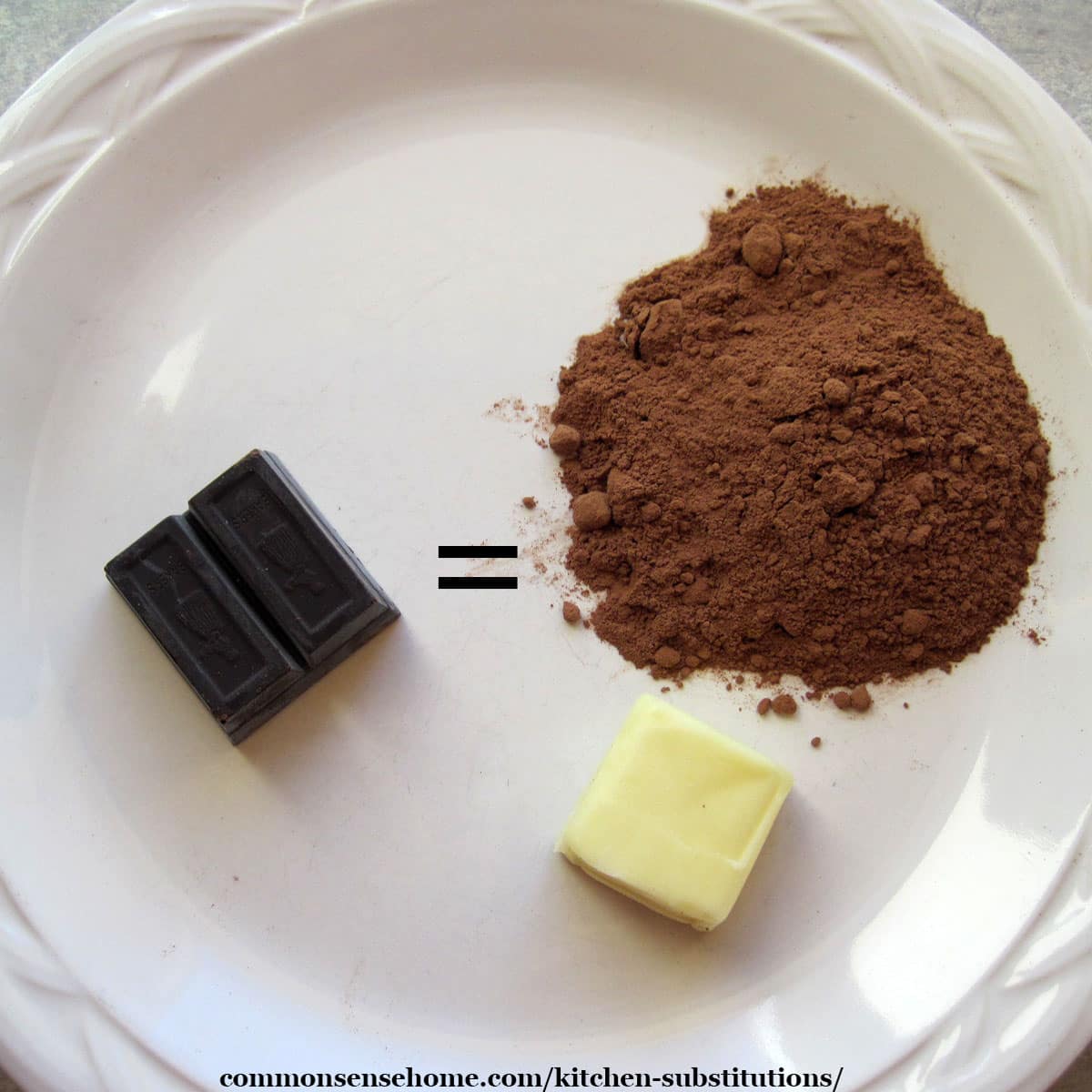
Chocolate and Cocoa Substitutions
1 square unsweetened chocolate (1 ounce) = 3 tablespoons cocoa plus 1 tablespoon fat (butter or coconut oil)
Chocolate, semisweet 6 ounces (1 cup) = 6 tablespoons unsweetened cocoa powder plus 7 tablespoons sugar plus 1/4 cup butter or coconut oil
1 ounce baking chocolate = 3 tablespoons carob powder plus 2 tablespoons water, coconut oil, milk or non-dairy milk
Milk Substitute for Cooking (And Other Dairy Products)
Depending on taste preferences, you can often substitute nut milks, seed milks or coconut milk or cream in recipes. Use the substitutes in equal amounts, such as one cup almond milk for one cup dairy milk.
Other milk substitutes include:
1 cup fresh whole milk = 1/2 cup evaporated milk plus 1/2 cup water
1 cup fresh whole milk = 1 cup reconstituted nonfat dry milk plus 2 tablespoons melted butter
1 cup fresh whole milk = 1 cup sour milk* or buttermilk plus 1/2 teaspoon soda (decrease baking powder 2 teaspoons)
1 cup sour milk* or buttermilk = 1 tablespoon lemon juice or vinegar plus enough fresh whole milk to make one cup
1 cup half & half = 1 cup whole milk + 1 tablespoon melted unsalted butter OR 1 cup evaporated milk
1 cup sour milk* or buttermilk = 1 cup plain milk kefir
*sour milk indicated naturally soured raw milk, not pasteurized milk that has gone past its recommended date of use. Pasteurized milk will rot, not sour.
Sour Cream, Yogurt, Cream and Substitutions
1 cup sour cream = 1 cup yogurt (this works better in sweet recipes than savory recipes, IMO)
1 cup cream, half-and-half = 1 1/2 tablespoons butter plus about 3/4 cup plus 2 tablespoons milk or 1/2 cup light cream plus 1/2 cup milk
1 cup heavy whipping cream = 1/3 cup butter plus about 2/3 cup whole milk
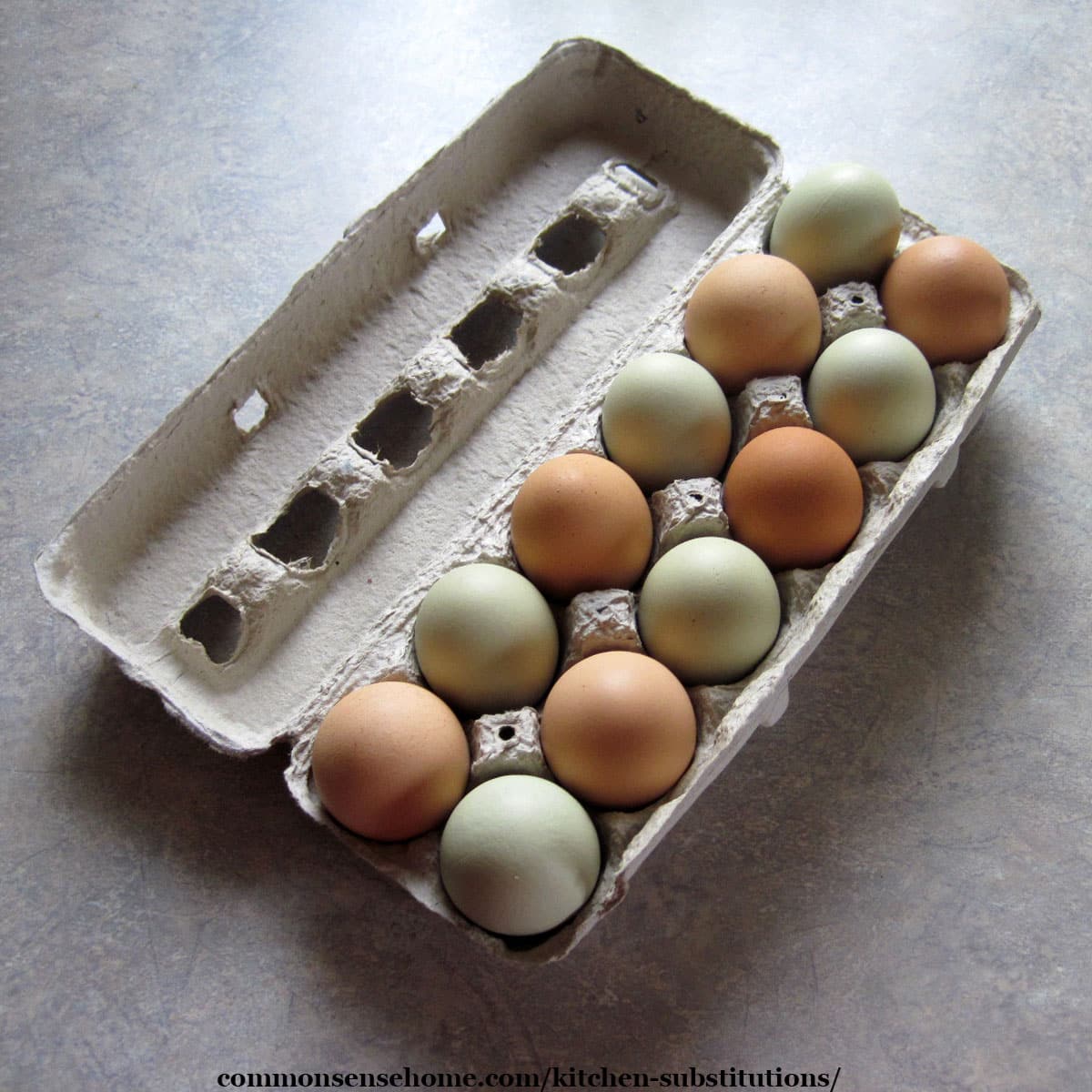
Egg Substitutions for Cooking
1 whole egg = 3 tablespoons water plus 1 Tablespoon chia seed (combine and let sit for 10 – 15 minutes until it gels – for baking)
1 whole egg = 1 tablespoon ground flax seeds plus 2-3 tablespoons water (simmer water and flax over low heat until it starts to gel – for baking)
1 whole egg = 2 egg yolks plus 1 tablespoon water (in cookies, cakes, etc.)
1 whole egg = 2 egg yolks (in custards or creamed dishes)
1 whole egg = 2 1/2 tablespoons dried egg beaten with 2 1/2 tablespoons water
Note: Some people have asked why you would substitute yolks for whole eggs. If you do a lot of baking, you’ll inevitably run into some recipes that use only whites (like meringue). This leaves leftover yolks. 🙂
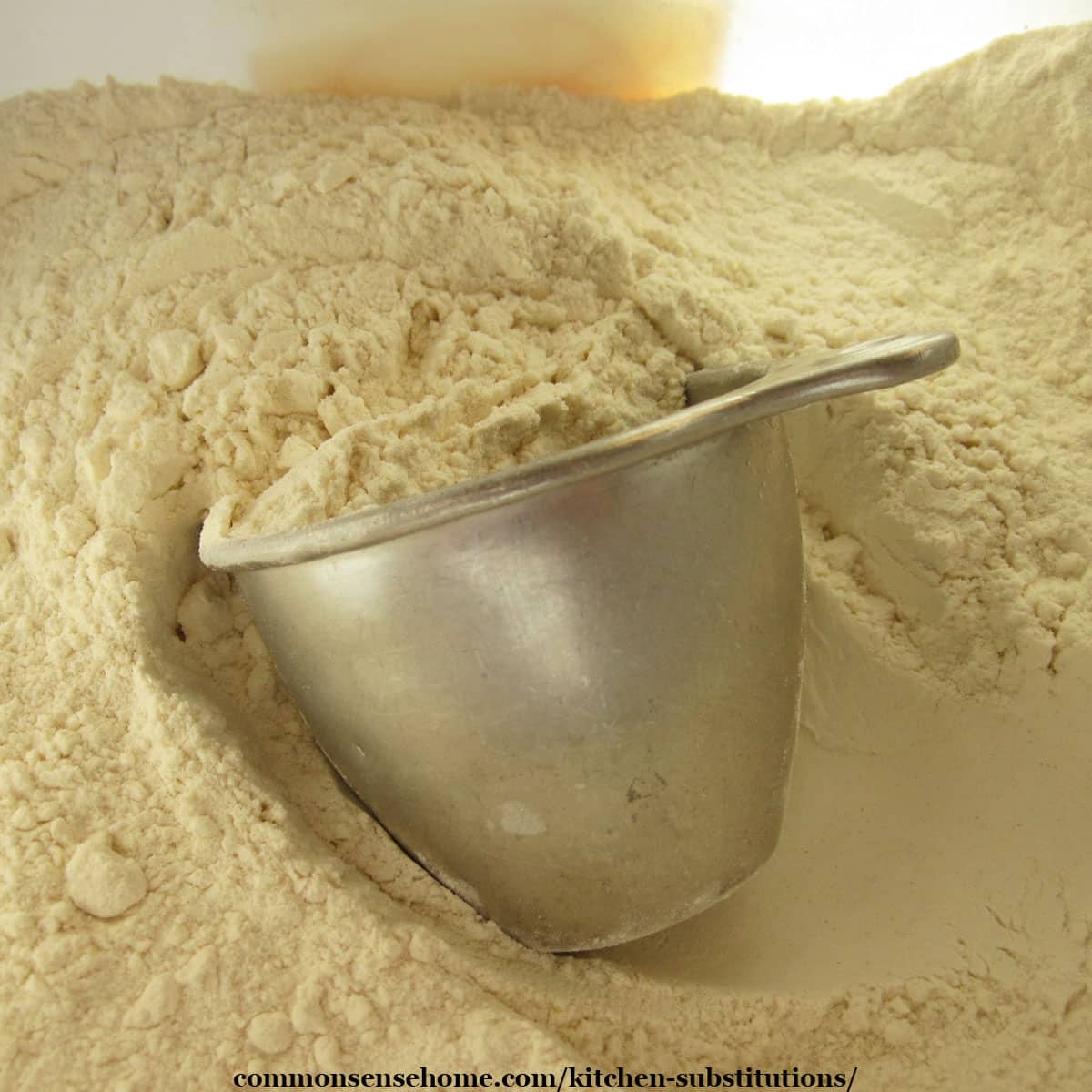
Substituting Flours, Leavening and Thickeners
1 tablespoon cornstarch (for thickening) = 2 tablespoons flour (approximately)
1 tablespoon flour (as thickening) = 1/2 tablespoon arrowroot or 2 teaspoons quick cooking tapioca
1 cup self-rising flour = 1 cup all purpose flour plus 1 tsp baking powder and 1/4 tsp salt
1 cup cake flour, sifted = 3/4 cup plus 2 tablespoons sifted all-purpose flour
1 teaspoon baking powder = 1/3 teaspoon baking soda plus 1/2 teaspoon cream of tarter
1 package dry yeast (1/4 ounce) = 2 1/4 teaspoons dry yeast or 1 cake of compressed yeast or 2 teaspoons SAF-INSTANT yeast or 2 1/4 teaspoons bread machine yeast
Would you like to save this?
Miscellaneous Kitchen Substitutions
These kitchen substitutions aren’t quite the same as the originals, but can get the job done. Think about the end flavor and texture you want when choosing your substitute.
Tomatoes
1 cup canned tomatoes = about 1-1/2 cups diced fresh tomatoes, simmered 10 minutes
2 cups tomato sauce = 3/4 cup tomato paste plus 1 cup water
1 cup tomato juice = 1/2 cup tomato sauce plus 1/2 cup water
6 to 8 sun-dried tomato halves, reconstituted in hot water = one pound fresh tomatoes
Bread Crumbs
1 cup bread crumbs = 3/4 cup cracker crumbs
1 cup bread crumbs = 1 cup crushed tortilla chips, potato chips, pretzels or crush cornflakes
Bread crumbs, dry, 1/4 cup = 1 slice bread
Bread crumbs, soft, 1/2 cup = 1 slice bread
Herbs, Spices, and Other Seasonings
1 tablespoon fresh herbs = 1 to 1/2 teaspoon dried herbs
1 tablespoon mustard = 1 teaspoon mustard powder, plus a little extra liquid, if needed
Garlic, 1 small clove = 1/8 teaspoon powder or 1/4 teaspoon granulated or 1/2 teaspoon minced garlic
One medium onion ~ one cup chopped onion, shallots or leeks ~ 2 teaspoons onion powder
Juice of one lemon = 2 tablespoons bottled lemon juice
Gelatin
Gelatin, 1/4 ounce envelope = about 2 1/4 teaspoons gelatin powder or 4 sheets gelatin (4×9 inches)
Broth
1 cup of broth = 1 bouillon cube + 1 cup boiling water OR 1 teaspoon bouillon granules + 1 cup boiling water
If you don’t have bouillon, you can substitute water, tomato juice, cooking wine or beer. (You may need to experiment to see what flavors you like.)
See also “How to make homemade chicken broth“.
Substitute for White Wine in Cooking
Some substitutions for white wine include:
- Apple cider vinegar
- Chicken broth
- Apple juice
- White grape juice
- White wine vinegar
- Ginger ale
- Water
Substitutes for Cooking Oil and Butter
The easiest substitute for cooking oil or butter is other oils.
For medium to high heat frying, use fats that are solid at room temperature:
- Butter
- Lard
- Tallow
- Refined coconut oil (has no coconut flavor)
- Schmaltz (chicken fat)
- Bacon grease
In baked good or other recipes, use equivalent amounts of a different fat or oil. Melted butter or coconut oil is my preferred substitute for cooking oil. Olive oil and avocado oil are other healthy alternatives.
I don’t recommend vegetable oil, because it is highly processed and most is made from genetically modified crops.
If you want to reduce fat, try swapping out half the fat for applesauce or other fruit or vegetable puree.
For example, instead of one half cup butter, use 1/4 cup applesauce and 1/4 cup butter.
Applesauce has a neutral flavor, and the pectin in apples helps bind together baked goods. Mashed bananas and sweet potatoes are other possible kitchen substitutions, but will add more sweetness.
Substitutions for Cooking Spray
I haven’t used cooking spray in years. Instead I substitute a solid fat like coconut oil or lard, and spread it around with a paper towel or clean hand.
Kitchen Measurement Equivalents
- 8 fluid ounces = 1 cup
- 240 milliliters – 1 cup
- 2 cups = 1 pint
- 4 cups = 1 quart
- 7/8 cup = 7 ounces (use a liquid cup measure)
- 0.95 liters = 1 quart
- 3 teaspoons = 1 Tablespoon
- 15 milliliters = 1 Tablespoon
- 5 milliliters = 1 teaspoon
- 1/2 tsp = two 1/4 teaspoons = 2.5 milliliters
- ¼ cup = 4 tablespoons
- 1/3 cup = 5 2/3 tablespoons
- 1 stick butter = ½ cup butter
- 12 ounces chocolate chips = 2 cups chocolate chips
Get the printable PDF version of the list here: Handy Kitchen Substitutions from Common Sense Home
I hope you find these kitchen substitutions helpful. I know there have been many times over the years in my kitchen where a recipe or meal has been saved by making do with a pantry raid instead of the long trip to town.
Do you have a substitution that I’ve missed? Please leave a comment below. Don’t forget to Pin this post for later. You know you’re going to need it someday. 😉
More posts from our Recipes and Kitchen Tips:
- How to Restore Cast Iron Cookware
- Natural Stove Cleaners
- 7 Things You Should Never Do to Your Cutting Board
Sources: Betty Crocker’s New Picture Cookbook (1961), The Cook’s Book of Useful Information and The Joy of Cooking.
Originally published in 2013, last updated in 2020.


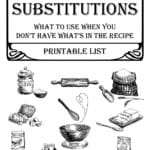
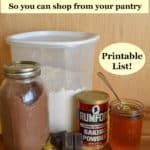
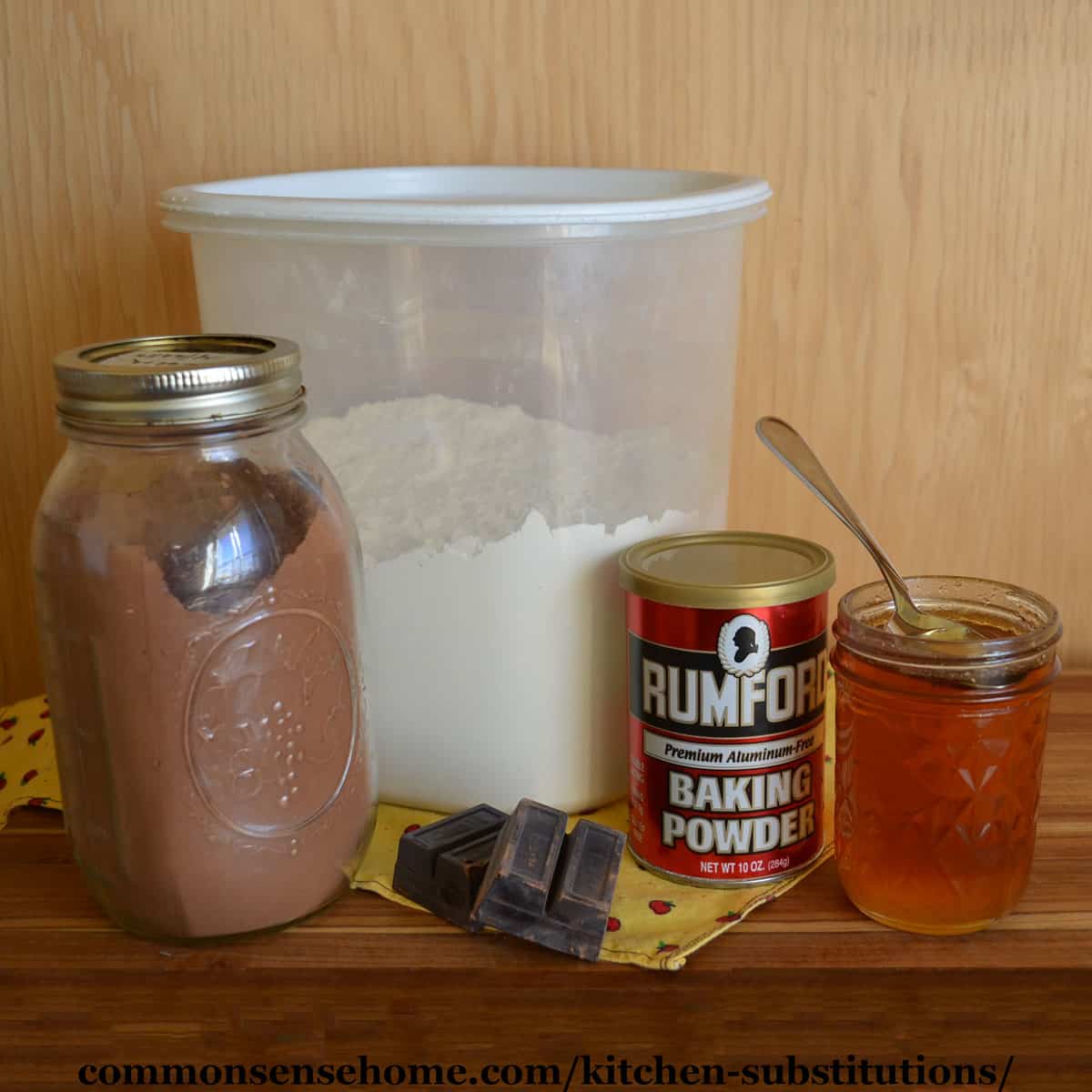
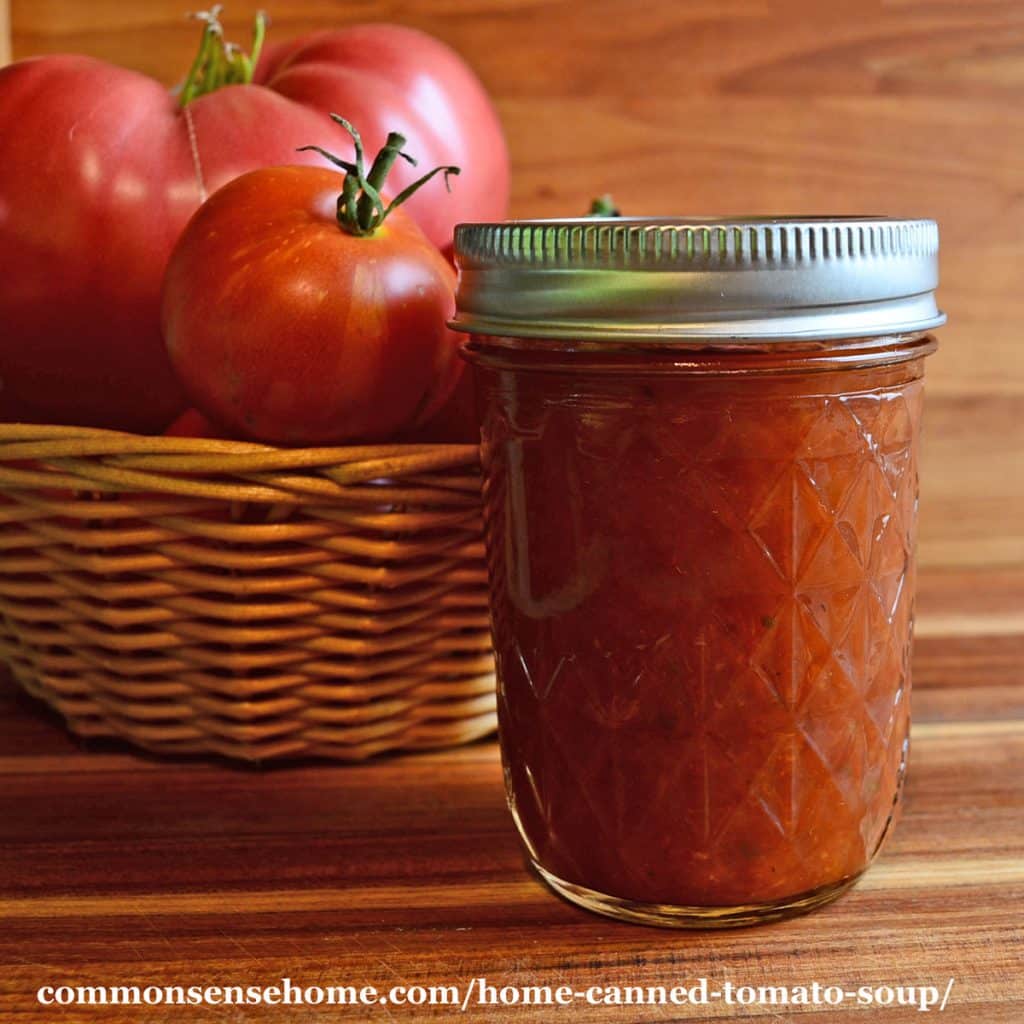
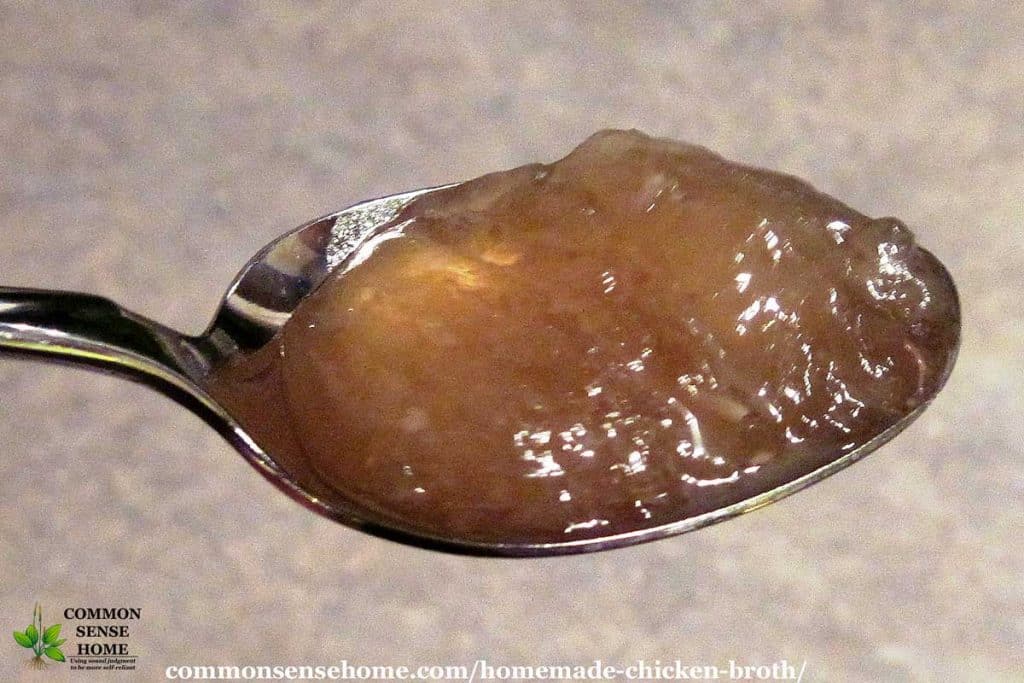
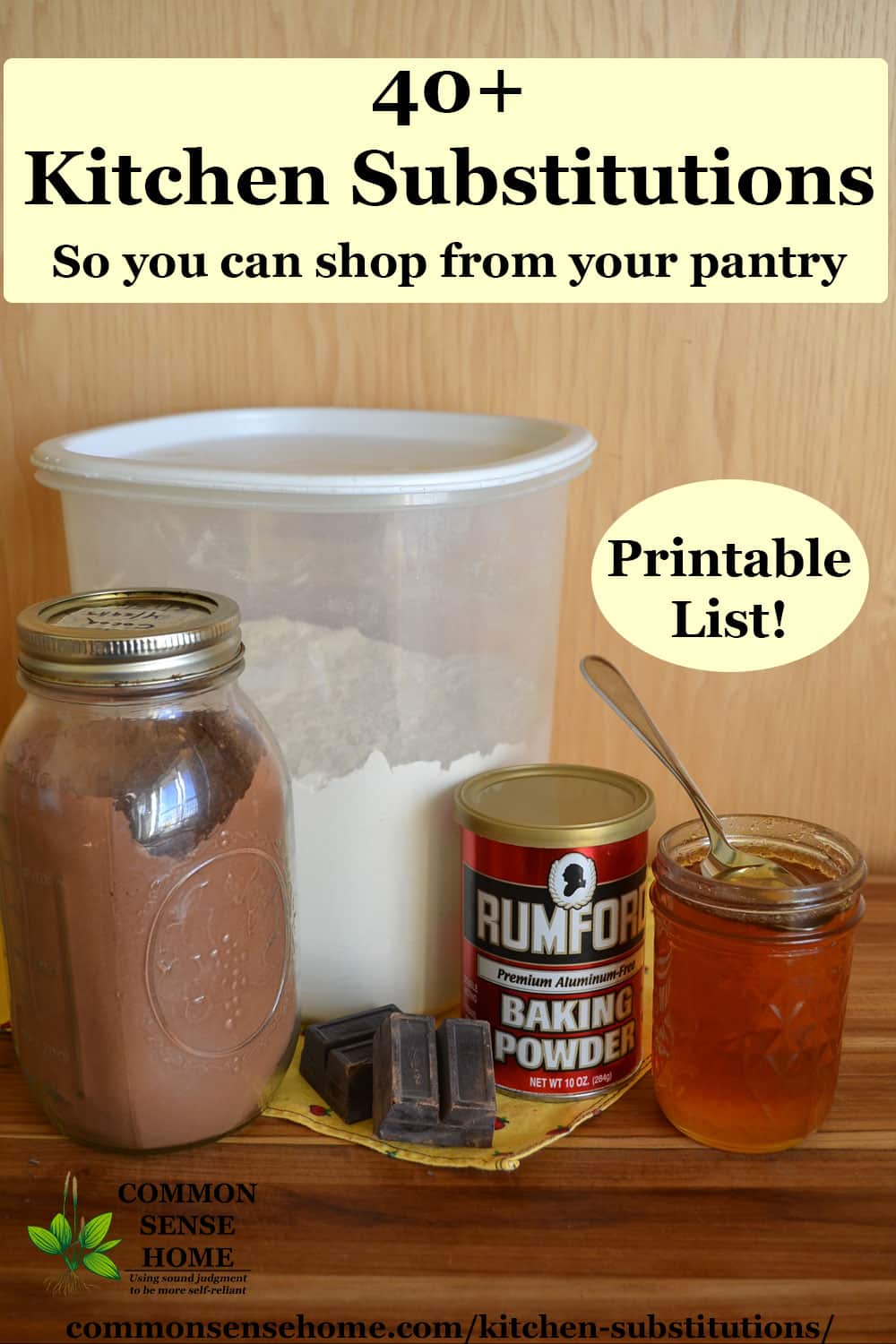
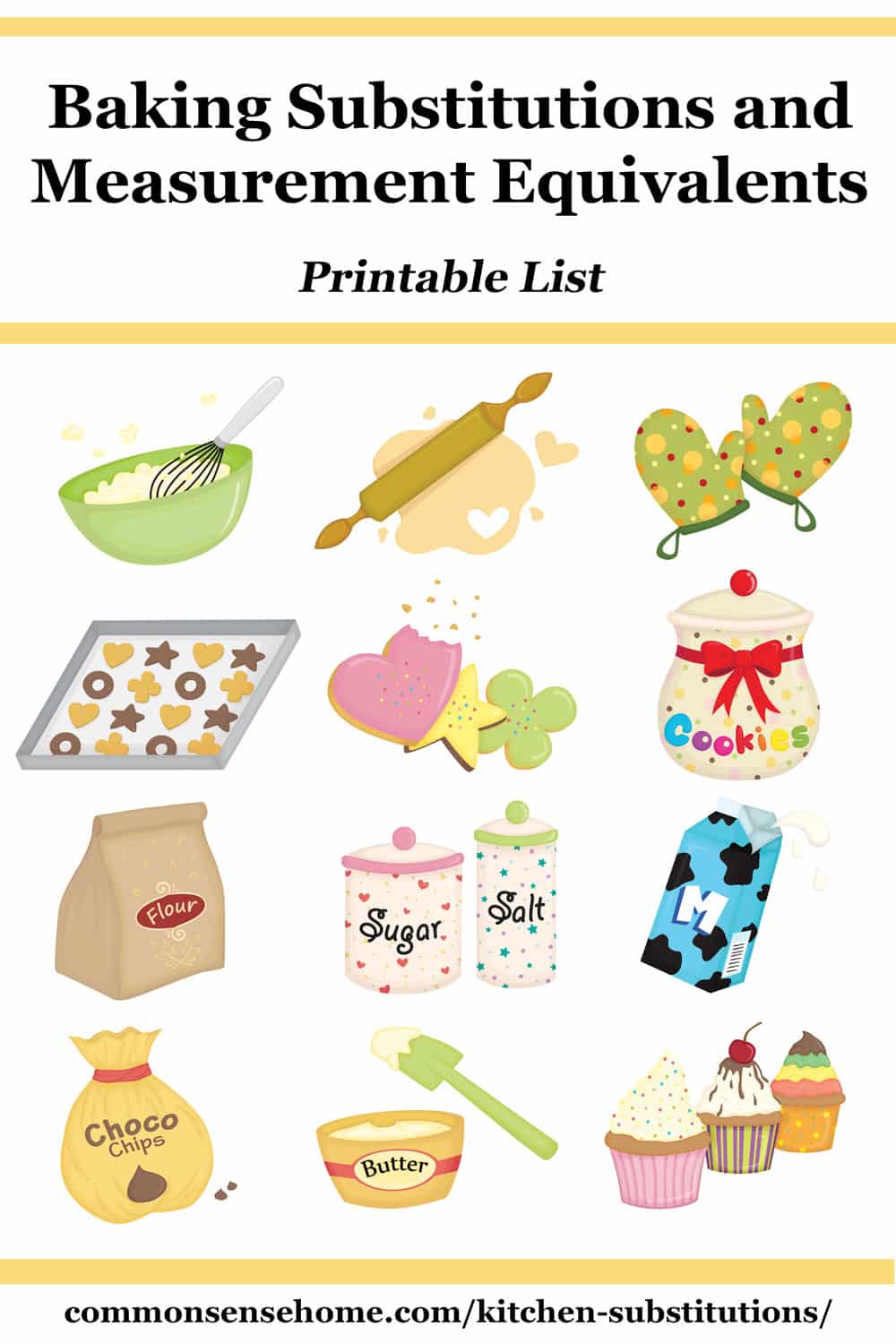
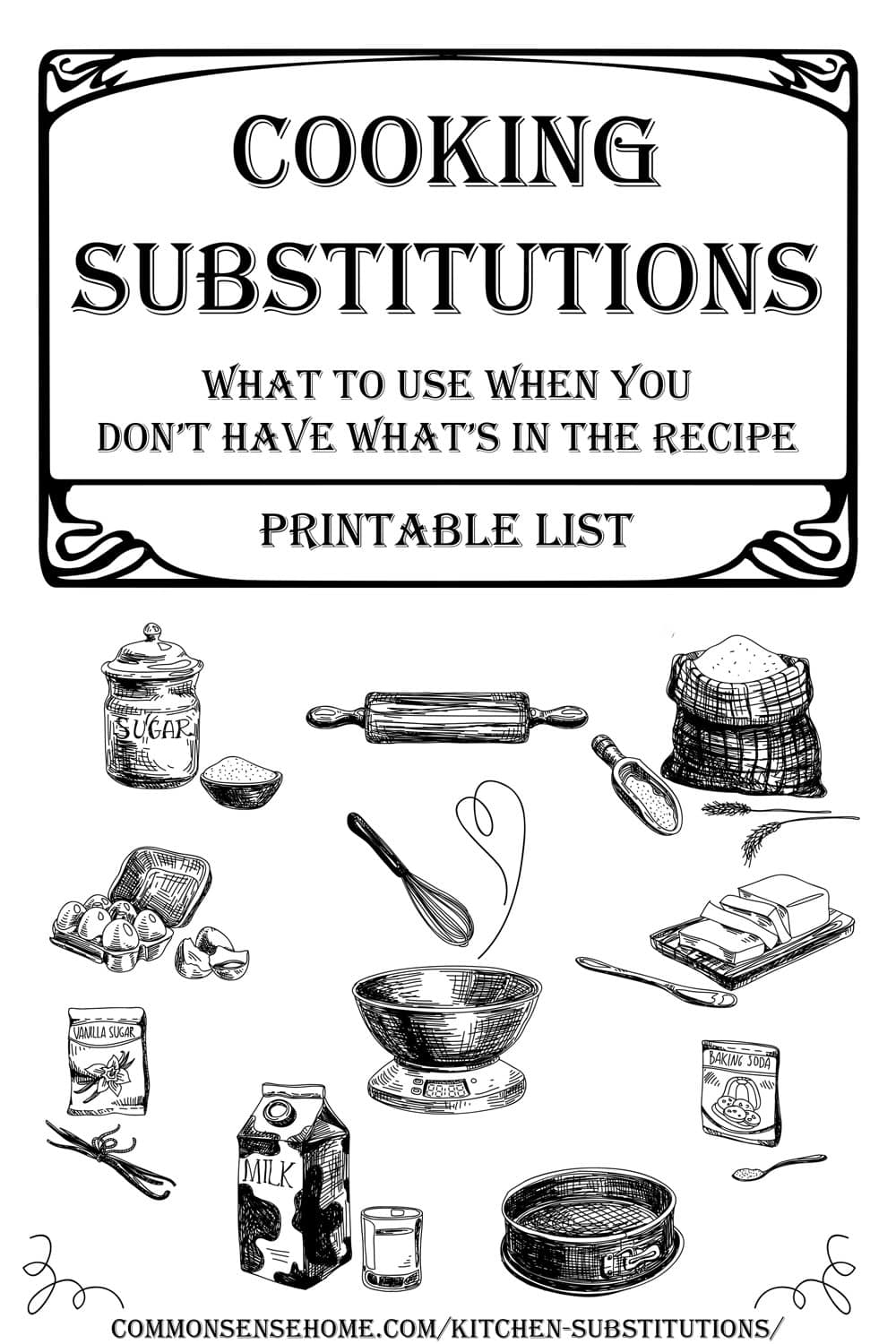
Do you have a sub for white wine used in recipes?
It’s typically just used for flavor. You might try some citrus or some vinegar.
The mustard substitution is good, but I would recommend adding a little vinegar to the dish. Most prepared mustards are vinegar-based.
Good note.
Appreciate the effort, but the printable PDF is only 2 pages, and the second one is blank…
Not sure what’s going on, but I just double checked the pdf and it’s two full pages. This is the first time I’ve heard from someone who ran into a blank page. I could try sending it to you as an email attachment if you like.
Check your inbox – I just sent a copy of the pdf.
How do you keep the egg yolks fresh until you use them? Or do you cook so much you don’t worry about it?
Thank you for this list!
You’re welcome. Eggs outside the shell will stay fresh for about a week in the fridge in a sealed container, or in the freezer for a month or so. I have mini pyrex containers that I keep them in. I stick a piece of masking tape on top and write the date on so I keep track of how old they are.
This is a tremendous help! Thank you. I’ve always hated making recipes that require only part of the egg. Now that I know how to substitute, I don’t believe I’ll be wasting as many eggs.
DO YOU HAVE A SUBSTITUTE FOR POWDERED SUGAR
You can blend 1 1/2 cups granulated sweetener with 1 tablespoon cornstarch or arrowroot in a high powered blender until desired consistency is reached.
White wine vinegar is good sub for lemon juice in recipes where lemon isn’t the focal point.
Thanks!
1 cup sour cream = 1/2 cup plain yogurt + 1/2 cup kefir provides the same taste as sour cream even in dip recipes!
Thanks!
i know that a person can use apple sauce in place of cooking oil…..ie in a cake mix……. but at what measurements do you use? say you need 1tbs of oil for a cake mix. how much apple sauce do you use? PS i hate dry cakes!!! LOL
They generally recommend a 1:1 swap, but you could try a little more if you like. I don’t use cake mixes, so this is not my area of expertise. 🙂
Thank You!!
You’re welcome!
I have used Mayonnaise instead of eggs during the Christmas baking frenzy
1/2 banana = 1 egg
I use it in my pancakes 😉
why can ‘t we just make a copy of this ….PRINT THIS IS NEEDED…thankyou ..
At the bottom of every post there is a little button that looks like a printer. When you scroll over it, it says “PrintFriendly”. This will allow to quickly and easily print all or part of any post on the site.
cut & paste!
I updated the post so the text “Handy Kitchen Substitutions from Common Sense Homesteading” takes you right to a nicely formatted pdf file.
Love the list. Thank you! I think it’s funny though that the substitute for a whole egg is two egg yolks plus water. Wouldn’t you then have two eggs and not need to substitute? LOL.
Sometimes I end up using just yolks or just whites for a recipe and so have the leftovers in the fridge or freezer, so that would be my guess as to where that one originated. 🙂
Great post!
I usually spend more time than I have trying to figure out substitutions. Now I have one go to place for the info I need. Thanks!
Thanks, Em. Have started using my Core Products hot pack at night to keep my feet warm and always think of you all on the other side of the state when I’m using it. 🙂
This is super helpful. Thanks a bunch!!
I have used most of these substitutions since I was a little avid baker in my childhood. Nice list! Sharing on FB right now.
I know you use a ton of creative substitutions on your website. 🙂